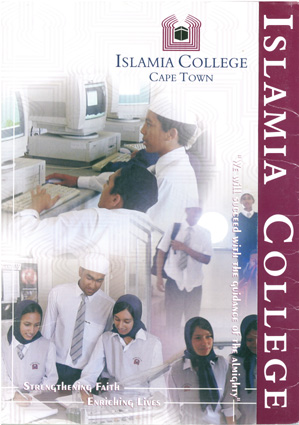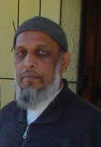|
 South Africa has about 80 so called independent Islamic schools. These are private faith schools which are accredited by the state but receive only a small subsidy from the government. They almost entirely rely on school fees and donations to meet their financial demands. Because of these circumstances most of these schools are elite institutions where parents pay high fees and this inadvertently limits attendance to pupils from middle and upper class families. South Africa has about 80 so called independent Islamic schools. These are private faith schools which are accredited by the state but receive only a small subsidy from the government. They almost entirely rely on school fees and donations to meet their financial demands. Because of these circumstances most of these schools are elite institutions where parents pay high fees and this inadvertently limits attendance to pupils from middle and upper class families.
Islamic schools have a long history in South Africa dating back to the 1920-1940s when many so called “Muslim Missonary Schools” were founded by the Muslim community. Most of them became so called state-aided schools and had the same status as the Christian Missionary Schools which were funded by the government.
When the democratic government was elected in 1994, the former state aided schools had to choose whether they became state schools or whether they wanted to be independent. Most of the Islamic schools opted for the latter status with the result that they had to raise their own funds and introduce high school fees.
 All Islamic independent schools follow the secular curriculum for public schools. In 1997 the Education Department introduced a new education policy which is called OBE (Outcome Based Education). This policy is aimed at promoting democratic citizenship education and allows for a flexible and open curriculum: no particular textbooks are prescribed and it is up to the individual teacher or school how to teach certain subjects. This policy does favour independent schools since it gives them the freedom and flexibility to teach according to their values and particular ethos. All Islamic independent schools follow the secular curriculum for public schools. In 1997 the Education Department introduced a new education policy which is called OBE (Outcome Based Education). This policy is aimed at promoting democratic citizenship education and allows for a flexible and open curriculum: no particular textbooks are prescribed and it is up to the individual teacher or school how to teach certain subjects. This policy does favour independent schools since it gives them the freedom and flexibility to teach according to their values and particular ethos.
Together with the state curriculum, Islamic schools offer Islamic Studies and Arabic. While the latter is acknowledged as an official subject the former is voluntary.
Interviews with principals, teachers and pupils of various Muslim schools show that the problems faced by Islamic schools are manifold: Since the institutions are independent they often struggle to meet the financial demands and have difficulties to find sponsors. Furthermore, many schools face problems with regard to management. There are often conflicts between the so called “Board of Trustees” which consists of the founders and the sponsors of the school who have a specific vision for the institution and the principal who has t#o manage the day-to-day affairs. Tensions also often arise over curriculum and teaching practice between the religious teachers and the teachers who have a secular education. While the former are often representing a particular religious school of thought which is conservative, such as the Deobandi, the latter are more open to modern teaching methods and liberal world views. Regarding the implementation of the national curriculum, many Islamic schools find it difficult to teach sex education and HIV-AIDS education, physical education for girls and the theory of evolution which, according to them, violates against Islamic values and beliefs. Lastly, Islamic schools often struggle with discipline problems regarding the pupils. Not all learners accept the Islamic code of conduct of the school. Often the Islamic rules at school do not correspond with the attitudes and life styles of the learner’s parents leading to a dichotomy of what they learn and observe at school and what they experience at home.
School profile: Islamia College, Cape Town
One of the Islamic independent schools which are included in the empirical study is Islamia College in Cape Town. The school was established in 1984, at a time when the resistance to the apartheid system was at a peak and teachers and pupils nationwide were organising school boycotts and education was practically not happening. The reasons for founding the school were mainly practical: to secure excellent education for Muslim children in an Islamic environment. The idea was to provide Muslim children with an education based on Islamic norms and values and to protect them from influences within the wider society which were regarded to be immoral. Furthermore, an Islamic school allowed the children to be educated at a school were they were not discriminated against because of their beliefs and where they were part of a larger community.
Today the school has over 1000 pupils and 70 teachers and, in terms of standard and Matric results, it is regarded to be among the best schools in the city. It has a Primary School and two High Schools (one for boys and one for girls) and its own mosque where pupils and teachers pray together. The school offers the national curriculum and, additionally, Islamic Studies and Arabic. Islamia College follows a holistic approach of Islamic education stating that among its objectives is to instil in pupils “a consciousness of Allah as the source of intellectual, emotional, spiritual and physical growth”. Like most Islamic schools, Islamia College pursues the ideal of “Islamisation of knowledge” by bringing religion into secular subjects. However, this seems to be a difficult undertaking. According to the founder of the school, Maulana Ali Adam, Islamia College has not yet achieved its goal to introduce Islam into secular subjects. Until now it is still up to the individual teacher to link certain topics of secular subjects to religious text from the Koran and the Sunna.
 To improve the quality of teaching and realise its goal to “islamise” the secular curriculum, Islamia College has joined an international research organisation called International Board of Educational Research and Resources (IBERR). The London based organisation is supporting Islamic schools mainly in England, South Africa and USA with school management, staff development and curriculum research. Since Maulana Ali Adam is one of the trustees of IBERR, a large part of the research and the publication of material is taking place in South Africa. To improve the quality of teaching and realise its goal to “islamise” the secular curriculum, Islamia College has joined an international research organisation called International Board of Educational Research and Resources (IBERR). The London based organisation is supporting Islamic schools mainly in England, South Africa and USA with school management, staff development and curriculum research. Since Maulana Ali Adam is one of the trustees of IBERR, a large part of the research and the publication of material is taking place in South Africa.
Locally, the school is well-integrated with the community, taking part in inter-school sports events and competitions, community activities and organising regular open days, a Children’s day and food parcels which are given to the poor and needy during Ramadan.
|